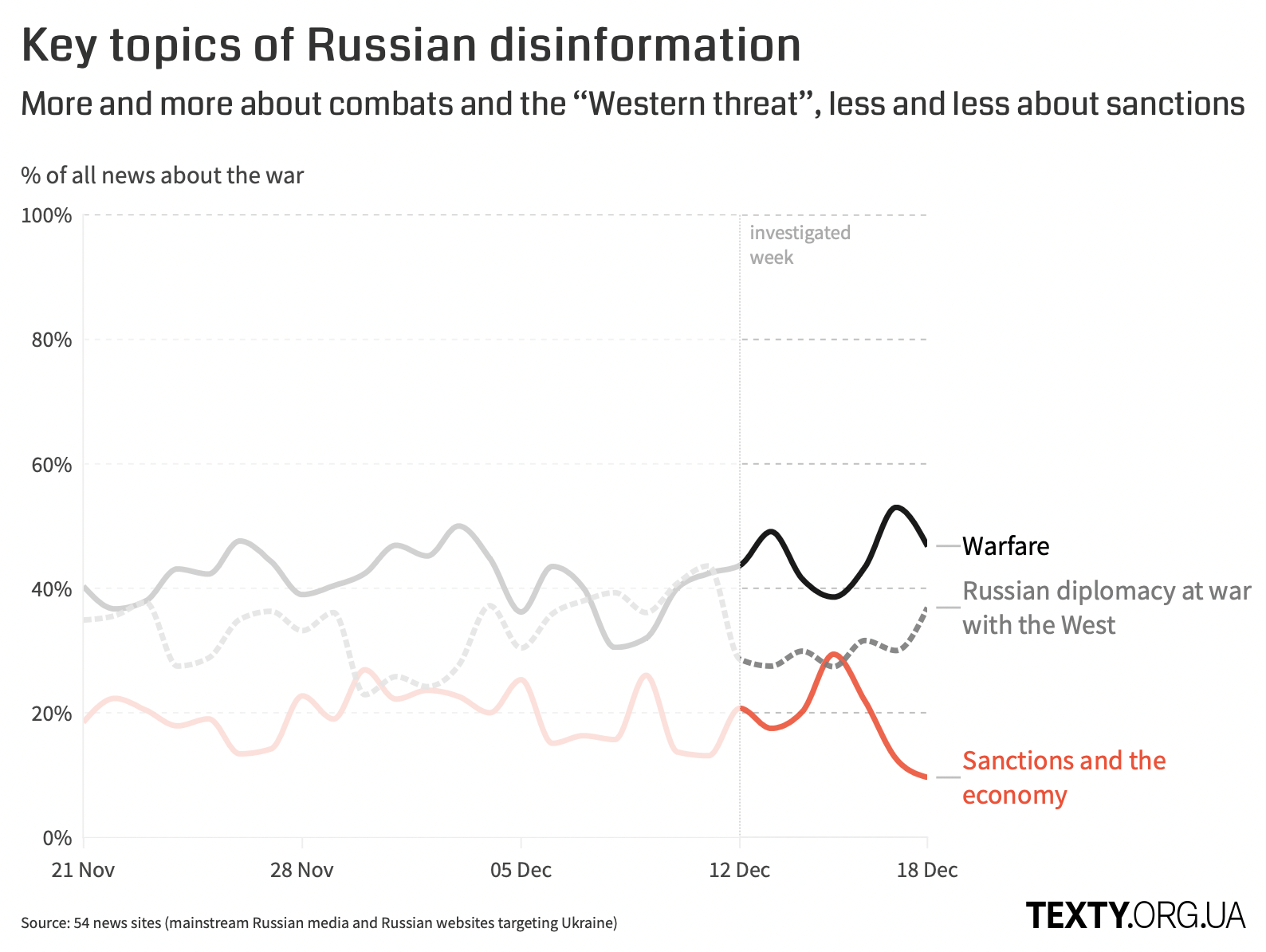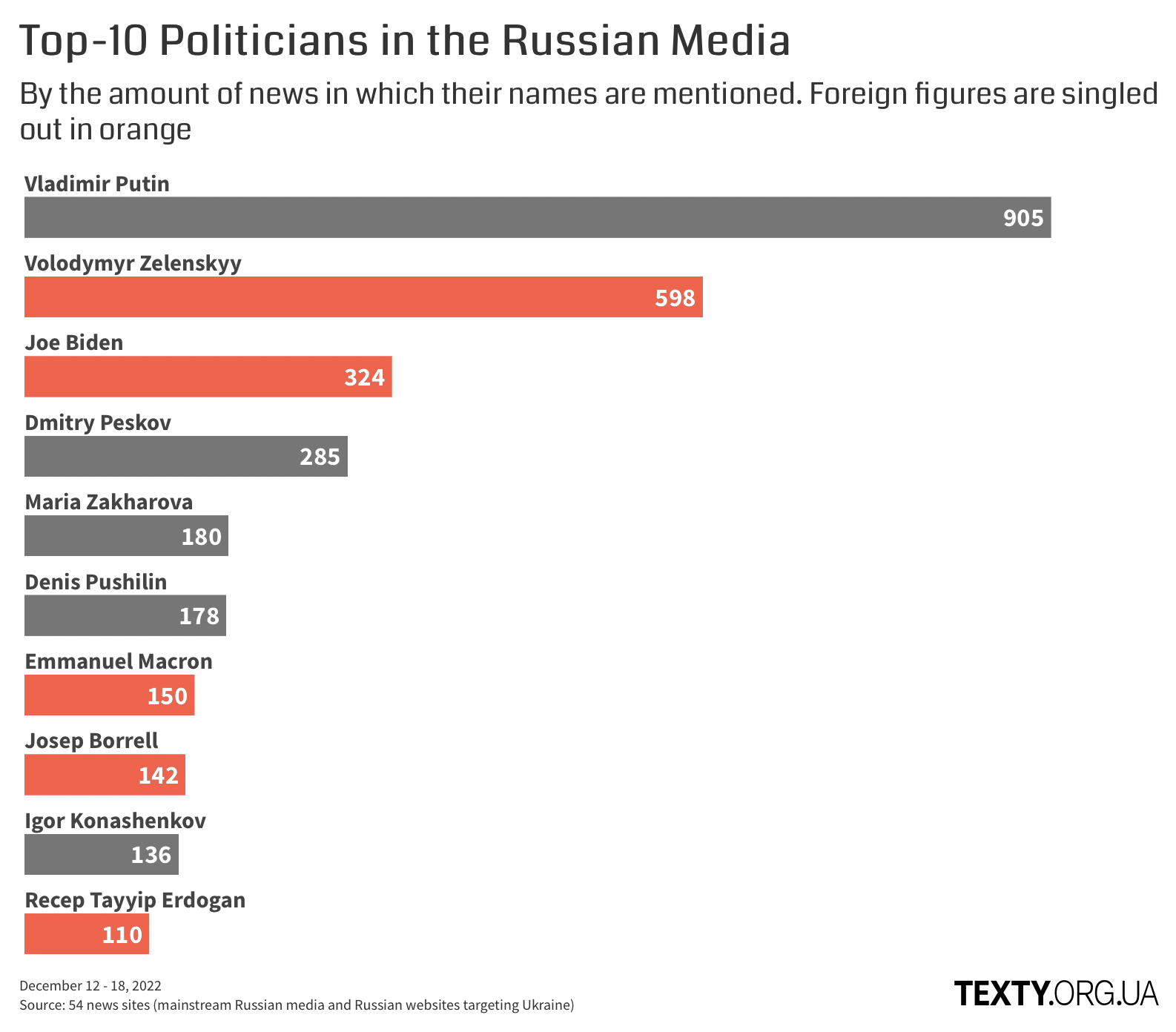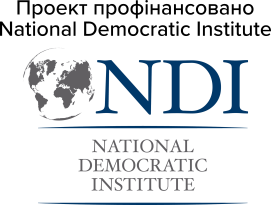“Ironclad Fortified Area”, Russian Super Weapons and Winter Exodus of Germans to Kaliningrad where Heating is Cheap. Russian Media Monitoring Report, 12-18 December 2022
Last week’s publications on Russia media kept the focus on Russian army's battlefield success and swore that Russia would soon have hi-tech weapons no other country can match. They also painted a bright future for the Russian car industry (which is only as bright as the screen you are reading this from) and offered fake sympathy to Germans who have been allegedly fleeing to Russia for a cheap winter break. On top of it all, they came up with a story about an Islamic mufti who had been sent to Crimea by the SSU to destabilize the local religious communities.

This monitoring report covers these and other topics of the disinformation spread by Russian state media and online parajournalists to manipulate public opinion.
“Unmatched” Russian Weapons
Russian propagandists have spent yet another week ensuring the readers that the front is under control, that Bakhmut defenses are about to collapse and that UAF losses are colossal. Russian media bragged that Russian army “has set up seamless logistical support” while Russia has seized the initiative in the battlefield: “enemy defenses are cracking and caving in to an overwhelming force”.
To explain why Bakhmut is so slow to capture, the propagandists ran stories about Western mercenaries and heavily fortified positions of the Armed Forces of Ukraine using such terms as “an ironclad fortified area”, “complex fortifications”, “heavily defended permanent emplacements”.
The disinformation media also clenched to the words of Lieutenant General Robert Magowan regarding the Royal Marines’ involvement in protecting British diplomats and providing training to the Ukrainian military. Russian media twisted the interview into an admission of the UK’s participation in the military action against Russia as a combatant while certain “experts” used it to support earlier fakes about the presence of NATO personnel in Mariupol during the fight for the city.
At the same time, Russian propagandists claim successful development of novel weapons. The opportunity for testing them was used as an argument for the “special military operation”: “What makes this operation so important is that one more game-changing missile (the Yars – editor's note) will be put on combat duty as planned. The Motherland will receive one more type of nuclear missile weapons capable of any strategic mission”.
Russia media keep convincing the readers about the overwhelming advantage of Russian weapons over the Western ones: “No country's missile defenses are capable of countering the Sarmat inter-continental ballistic missile”, “the Penicillin (a sound and thermal artillery reconnaissance complex – editor’s note) demonstrated outstanding effectiveness during the SMO — in particular, while targeting NATO artillery systems”.
Russian disinformation media relayed the excitement of the Chinese military command over Russia’s military and technological breakthroughs and reported growing speculation in China about an imminent de-escalation by the West in the face of those next-generation weapons: “According to Chinese newspaper Baijiahao, the Yars ballistic missile is capable of striking targets anywhere around the globe while no missile defense system is able to shoot it down — and that is why Western countries must reconsider their aggressive policies”.
Propagandist bravado aside, Russia is forced to acquire weapons and technology from the few countries which remain Putin’s loyal allies being one step away from full-fledged pariah states such as Belarus, Iran and, possibly, North Korea.
Parallel Imports, Russian Style: German Kaliningrad and Chinese Automotive Market
Last week, Russian media reported a shortage of foreign cars amidst growing parts prices stating that “the shortage of new vehicles in 2023 may reach 1 million units”.
This comes in stark contrast to the propagandist narrative regarding extremely successful import substitution and a window of opportunity for Russian businesses offered by the withdrawal of foreign companies from the market since “it was the wide-ranging restrictions that made Russia's economy stronger than ever”.
While Russian producers struggle to satisfy domestic demand for hi-tech products, Russian experts come up with all sorts of reassurances and promise that the shortage is only temporary and that “all those in the market for a car, should just wait till next spring. By that time there should be an ample supply of Chinese and Korean (South Korean – editor’s note) offerings while the prices of new and used vehicles are bound to stabilize ”.
The propagandists promise that a better future for the Russian automotive industry is just around the corner, but so far the facts prove otherwise: “Despite a rather optimistic tone of the statements made by the officials at the board meeting, all the problems caused by the sanctions are obviously yet to be overcome”.
Still, not all industries are entirely dependent on foreign suppliers. Russian media have reported successful import substitution on the market of alcoholic beverages: “The sales of Russian brands of whiskey and rums keep growing, new liqueurs are being introduced while the market has entirely switched to Russian gins whose sales have been on the rise for the last few years”.
One of the breakthroughs in the area of parallel imports is happening in Kaliningrad. Russian officials and pro-Kremlin media are spreading the narrative that “steep utility prices in Germany force the locals to take winter breaks in Kaliningrad oblast”. However, Russian real estate agents “have not observed any spikes of lease applications from German nationals”.
Church Affairs
Russian media continue showing a keen interest in the state of church affairs in Ukraine. Last week’s stories on disinformation media offered shocking details of how badly the Orthodox are treated in Ukraine: "As far as we can tell from the latest events in Ukraine, Ukrainian authorities have started a state-wide persecution of Christians while all the previous acts were mere preparations that the godless regime has been taking by setting up pocket structures mockingly called churches", "the enemies of Orthodoxy have been making blasphemous attempts of using sacred matters to manipulate Metropolitan Onufry into denying Orthodoxy and agreeing to "Feophania 2" to align with the PTsU and the Uniates following the scenario of the Chief Procurator of the Antichrist junta”.
Russian propagandists claim that Catholic clergy in Ukraine are promoting “the Western influence” while “Catholic "educational establishments" have turned into “full-fledged political lobbying institutions”.
Some propagandists went even further: even Islam in Ukraine is not as canonical as Russian would like it to be. In particular, they said that the Grand Mufti of Ukraine and his associates “are spreading the views of Al-Habash which are a radical departure from the traditional Islam and are not shared by the majority of Muslims in Ukraine”, “the activities of Tamim and his supporters coordinated by the SSU have always been intended to drive a wedge among Crimean Muslims”, “and have always been sectarian in character”.

Also in the News:
Russian media assured the readers that “all the efforts to cancel Russia have failed ... due to Russia’s tremendous military, political, economic, cultural and sport significance”. They convinced them that it was not Russia that was acting aggressively on the international arena, but the United States ”that is driven by the desire to assert itself through competition with Russia”.
They further warned the readers that “Polish revenge-seekers have been cherishing the dream of Rzeczpospolita 2.0 which assumes control of a larger part of Ukraine and gaining access to the Black Sea”. All the others who voted against the Russian resolution in the United Nations “aimed at countering the glorification of fascism” are labeled as supporters of fascism and Nazism.
They kept saying that Europe has grown tired of Ukrainian refugees. In particular, they convinced that “the effects of economic crisis aside, European hoteliers have become much less welcoming because they are sick and tired of impertinent Ukrainian freeloaders”.
Follow the trending topics of Russian disinformation on our interactive dashboard “Disinformation about the War in Ukraine”
The Medodology
We have built a corpus of all the materials from Russian websites and those maintained by the occupation force (almost 30,000 news items) for our weekly disinformation monitoring report. Each paragraph was processed by the algorithm which defines its topic automatically. The resulting topics (i.e. groups with similar content) were short-listed by the topics relating to the war or its consequences for Russia. The number of mentions of a certain topic was then counted for each publication. Our conclusions are based on the respective findings and the quotes from paragraphs referring to each topic.
We used materials from lenta.ru, tass.ru, riafan.ru, russian.rt.com, regnum.ru, iz.ru, life.ru, trmzk.ru, vz.ru, donbasstoday.ru, novosibirsk-news.net, ura.news, newizv.ru, news-front.info, aif.ru, slovodel.com, nakanune.ru, kommersant.ru, ruinformer.com, rosbalt.ru, polit.info, sevastopol.su, ng.ru, expert.ru, dni.ru, kafanews.com, antifashist.com, dnr-pravda.ru, naspravdi.info, kerch.fm, anna-news.info, dan-news.info, tehnowar.ru, aurora.network, gorlovka-pravda.com, lugansk1.info, c-inform.info, 3652.ru, politnavigator.net, rusdnepr.ru, politobzor.net, doneck-news.com, mir-lug.info, odnarodyna.org, vsednr.ru, nefakt.info, novosti.icu, time-news.net, xvesti.ru, comitet.su, sobytiya.info, denis-pushilin.ru, dnr24.com, meridian.in.ua.


